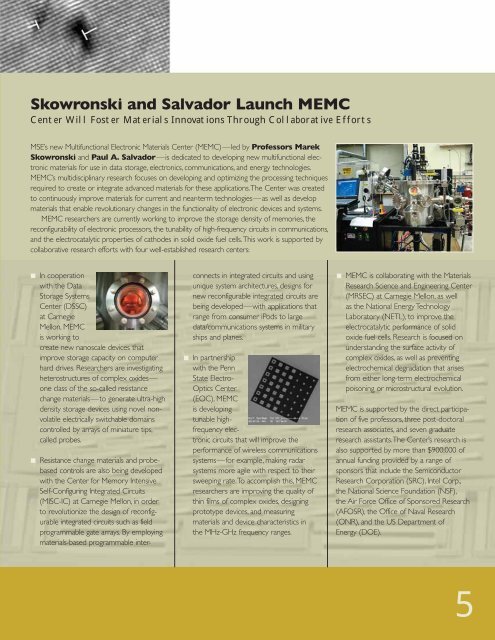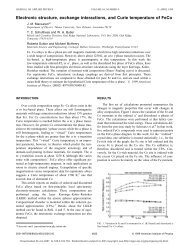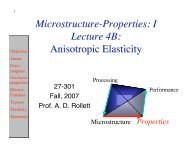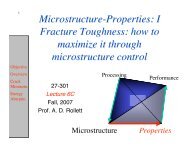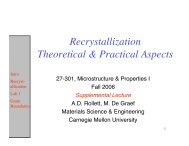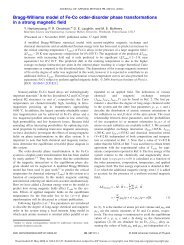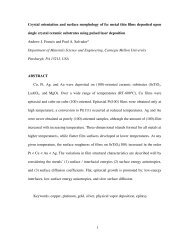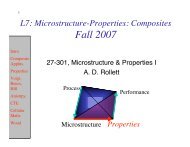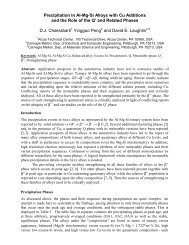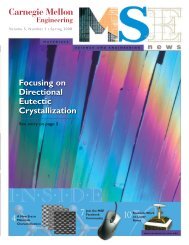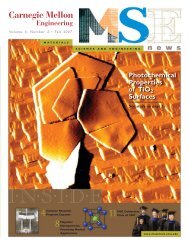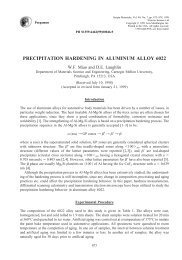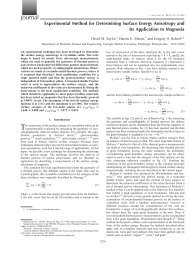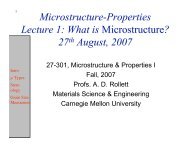Carnegie Mellon - Materials Science and Engineering - Carnegie ...
Carnegie Mellon - Materials Science and Engineering - Carnegie ...
Carnegie Mellon - Materials Science and Engineering - Carnegie ...
You also want an ePaper? Increase the reach of your titles
YUMPU automatically turns print PDFs into web optimized ePapers that Google loves.
Skowronski <strong>and</strong> Salvador Launch MEMC<br />
Center Will Foster <strong>Materials</strong> Innovations Through Collaborative Efforts<br />
MSE’s new Multifunctional Electronic <strong>Materials</strong> Center (MEMC)—led by Professors Marek<br />
Skowronski <strong>and</strong> Paul A. Salvador—is dedicated to developing new multifunctional electronic<br />
materials for use in data storage, electronics, communications, <strong>and</strong> energy technologies.<br />
MEMC’s multidisciplinary research focuses on developing <strong>and</strong> optimizing the processing techniques<br />
required to create or integrate advanced materials for these applications. The Center was created<br />
to continuously improve materials for current <strong>and</strong> near-term technologies—as well as develop<br />
materials that enable revolutionary changes in the functionality of electronic devices <strong>and</strong> systems.<br />
MEMC researchers are currently working to improve the storage density of memories, the<br />
reconfigurability of electronic processors, the tunability of high-frequency circuits in communications,<br />
<strong>and</strong> the electrocatalytic properties of cathodes in solid oxide fuel cells.This work is supported by<br />
collaborative research efforts with four well-established research centers:<br />
■ In cooperation<br />
with the Data<br />
Storage Systems<br />
Center (DSSC)<br />
at <strong>Carnegie</strong><br />
<strong>Mellon</strong>, MEMC<br />
is working to<br />
create new nanoscale devices that<br />
improve storage capacity on computer<br />
hard drives. Researchers are investigating<br />
heterostructures of complex oxides—<br />
one class of the so-called resistance<br />
change materials—to generate ultra-high<br />
density storage devices using novel nonvolatile<br />
electrically switchable domains<br />
controlled by arrays of miniature tips,<br />
called probes.<br />
■ Resistance change materials <strong>and</strong> probebased<br />
controls are also being developed<br />
with the Center for Memory Intensive<br />
Self-Configuring Integrated Circuits<br />
(MISC-IC) at <strong>Carnegie</strong> <strong>Mellon</strong>, in order<br />
to revolutionize the design of reconfigurable<br />
integrated circuits such as field<br />
programmable gate arrays. By employing<br />
materials-based programmable inter-<br />
connects in integrated circuits <strong>and</strong> using<br />
unique system architectures, designs for<br />
new reconfigurable integrated circuits are<br />
being developed—with applications that<br />
range from consumer iPods to large<br />
data/communications systems in military<br />
ships <strong>and</strong> planes.<br />
■ In partnership<br />
with the Penn<br />
State Electro-<br />
Optics Center<br />
(EOC), MEMC<br />
is developing<br />
tunable highfrequencyelectronic<br />
circuits that will improve the<br />
performance of wireless communications<br />
systems—for example, making radar<br />
systems more agile with respect to their<br />
sweeping rate. To accomplish this, MEMC<br />
researchers are improving the quality of<br />
thin films of complex oxides, designing<br />
prototype devices, <strong>and</strong> measuring<br />
materials <strong>and</strong> device characteristics in<br />
the MHz-GHz frequency ranges.<br />
■ MEMC is collaborating with the <strong>Materials</strong><br />
Research <strong>Science</strong> <strong>and</strong> <strong>Engineering</strong> Center<br />
(MRSEC) at <strong>Carnegie</strong> <strong>Mellon</strong>, as well<br />
as the National Energy Technology<br />
Laboratory (NETL), to improve the<br />
electrocatalytic performance of solid<br />
oxide fuel cells. Research is focused on<br />
underst<strong>and</strong>ing the surface activity of<br />
complex oxides, as well as preventing<br />
electrochemical degradation that arises<br />
from either long-term electrochemical<br />
poisoning or microstructural evolution.<br />
MEMC is supported by the direct participation<br />
of five professors, three post-doctoral<br />
research associates, <strong>and</strong> seven graduate<br />
research assistants. The Center’s research is<br />
also supported by more than $900,000 of<br />
annual funding provided by a range of<br />
sponsors that include the Semiconductor<br />
Research Corporation (SRC), Intel Corp.,<br />
the National <strong>Science</strong> Foundation (NSF),<br />
the Air Force Office of Sponsored Research<br />
(AFOSR), the Office of Naval Research<br />
(ONR), <strong>and</strong> the US Department of<br />
Energy (DOE).<br />
5


